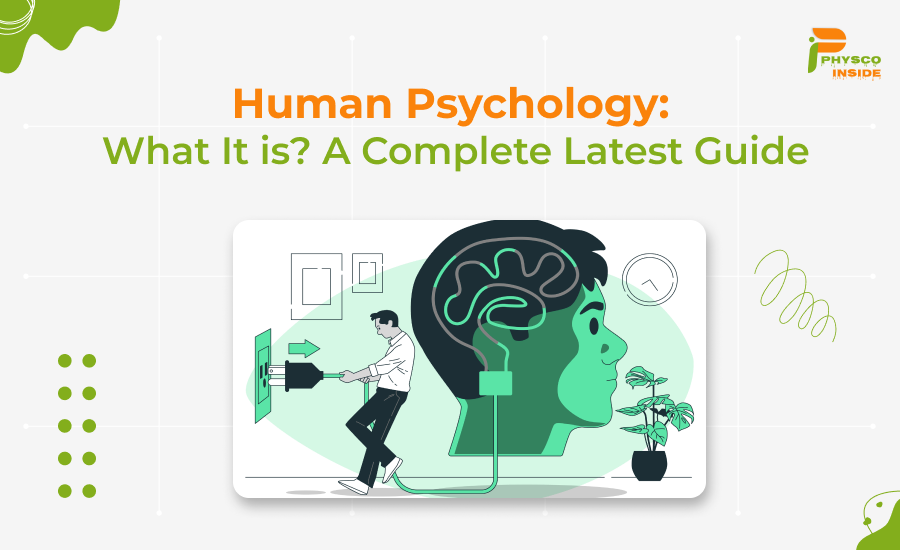(1) Introduction:
The field of human Psychology is a complex one that Explores the various sides of human Psychology and behavior. It covers different areas such as Perception, emotions, development, and social Interaction, and is based on a Thorough logical order. Scientists aim to solve the Complexities of human experience by Focusing on Cognition, memory, learning, and personality. Understanding human Psychology provides Insights into individual differences, mental health, and Cultural abnormality. This article gives you proper information about human Psychology. Also give details about human Biological, Cognitive, Environmental, social, and Psychological factors. Through Observed research and Theoretical structure. It lays the foundation for solving practical problems. It is also Enhancing health in various settings, from education and Healthcare to business and more.
(2) What is Human Psychology?
“Human Psychology is the scientific study of human behavior, thoughts, emotions, and mental Processes”. Its goal is to understand how people perceive, think, feel, and behave, by Conducting correct research and Developing Theoretical structure.
(3) What is the History of Human Psychology?
The study of human Psychology can be traced back to ancient Civilizations, but formal research began in the late 19th century. Wilhelm Wundt was the first to Establish a Psychology Laboratory that focused on Consciousness. The Psychoanalytic theory of Freud and the Behaviorism of Watson and Skinner greatly Influenced the field. The mental health crisis in the 20th century shifted the focus to mental Processes. Today Psychology Encloses various perspectives and Subfields, shaped by ongoing research and Technological Advancements.
(4) What are the Branches of Human Psychology?
Some of the main Branches of human Psychology include:
A short Description of the above-mentioned Branches is following:
- (4.1) Clinical Psychology: This branch focuses on the Evaluation, Diagnosis, and treatment of mental Disorders and Profound issues.
- (4.2) Cognitive Psychology: The study of mental Processes such as Perception, memory, thinking, and Problem-Solving.
- (4.3) Developmental Psychology: The study of how individuals grow and change across the Lifespan, from birth to old age.
- (4.4) Social Psychology: This branch researches how People’s thoughts, feelings, and behaviors are affected by the presence of others.
- (4.5) Behavioral Psychology: Investigate how Observable behaviors are learned, adapted, and Established.
- (4.6) Personality Psychology: The study of individual differences in behavior, traits, and Qualities.
- (4.7) Educational Psychology: Applies Psychological Principles to understanding and Improving teaching and learning experiences.
- (4.8) Industrial-Organizational Psychology: Focuses on Applying Psychological Concepts to Workplace Settings. It includes employee Motivation, Leadership, and Organizational behavior.
- (4.9) Health Psychology: Examines how Psychological factors impact health, illness, and Healthcare behaviors.
- (4.10) Forensic Psychology: Applies Psychological Principles to legal and law application Settings. It includes outline, witness evidence, and Rehabilitation.
- (4.11) Neuropsychology: Studies the relationship between brain function and behavior. It includes mental Abilities and deep Regulation.
- (4.12) Counseling Psychology: Focuses on helping individuals cope with and Overcome personal challenges and mental health issues.
- (4.13) Experimental Psychology: Conducts research to determine Fundamental Psychological Processes and Principles.
- (4.14) Positive Psychology: Specify the study of strengths, health, and leading human Functioning.
- (4.15) Comparative Psychology: Analyzes behavior and mental Processes across different species to understand Evolutionary and Biological influences.
These Branches of human Psychology Contribute to the understanding of human behavior and mental Functioning.

(5) What is the Importance of Studying Human Psychology?
It is important to focus on human Psychology for various reasons:
A short Description of the above key factors is following:
- Understanding Human Behavior: Human behavior helps us understand why people behave the way they do. It provides Insights into the factors that impact thoughts, emotions, and actions.
- Enhancing Mental Health: Psychological research informs the development of effective Interventions. It Enhances mental Disorders, Improving Diagnosis, treatment, and Prevention efforts.
- Improving Relationships: Knowledge of Psychology enables better Interpersonal communication. It improves empathy, and Dialogue skills, Strengthening personal and professional relationships.
- Advancing Well-being: Psychology offers methods for Managing stress. It builds strength, and improves overall mental and spiritual health, Contributing to a higher quality of life.
- Informing Education and Learning: Psychological Principles inform teaching methods, development, and Educational Policies. It Enhances learning Outcomes for students of all ages.
- Promoting Workplace Efficiency: Understanding human behavior in Organizational Settings Enhances employee Motivation, Leadership Effectiveness, and team dynamics. It ultimately improves Workplace Productivity and pleasure.
- Encourage Personal Growth: Psychology Encourages Awareness, Self-reflection, and Self-improvement. It Empowers individuals to Overcome challenges, set Meaningful goals, and lead fulfilling lives.
Overall, Focusing on human Psychology provides valuable Insights into the problems of the human mind and behavior. It Facilitates positive change at individual, Societal, and global levels.
(6) What are the Biological foundations of Human Psychology?
The Biological Foundations of Human Psychology Research refer to the Fundamental Biological factors. It affects human behavior, Perception, and mental Processes. These foundations Surround various fields of science, including Genetics, Neurobiology, and Evolutionary Psychology. These fields together shape the structure and function of the human mind and behavior. Understanding these Biological foundations is Essential for following the Complexities of human Psychology and behavior.

(7) What are the Cognitive Processes in Human Psychology?
Key Cognitive Processes include:
A short Description of the above key points is following:
- Perception: Organizing and Explaining sensory information from the environment.
- Attention: Focusing mental resources on specific stimuli or tasks.
- Memory: Encoding, storing, and Recovering information for later use.
- Language: Communicating thoughts and ideas through spoken, written, or signed symbols.
- Thinking: Mental Processes such as Problem-Solving, Reasoning, and Decision-making.
- Creativity: Generating novel and useful ideas or solutions.
- Meta-Cognition: Awareness and understanding of one’s mental processes and plans.
- Executive Function: Higher-level mental Abilities involved in planning, organization, and Self-regulation.
- Concept Formation: Mental Classification of objects, events, or ideas based on common Features or Characteristics.
- Judgment and Decision Making: Evaluating options and making choices based on available information and liking.
(8) How is Emotional Regulation Linked to Human Psychology?
Emotional Regulation is closely connected to human Psychology as it plays an important role in shaping behavior, Cognition, and overall health. Here’s how it works:
(8.1) Emotional Processing:
Human Psychology Involves understanding and processing emotions, including their causes, effects, and Regulation plan. People’s ability to Regulate emotions affects how they Perceive, Interpret, and respond to different situations.
(8.2) Behavioral Responses:
Personal Regulation influences social responses to stimuli. Individuals may engage in Adaptive or maladaptive behaviors based on their ability to Regulate emotions Effectively.
For example, someone with poor personal Regulation skills may react Emotionally or Aggressively in Stressful situations.
(8.3) Cognitive Functioning:
Personal Regulation affects mental Functioning, including attention, memory, and direction. Personal arousal can enhance or impair mental Processes, Depending on how well emotions are Regulated. High personal arousal may limit attention and inhibit Navigation. While effective deep Regulation can enable clearer thinking and Problem-Solving.
(8.4) Psychological health:
Effective personal Regulation is Associated with greater Psychological health. It includes lower levels of stress, anxiety, and Depression. Individuals who can manage their emotions experience greater strength and Adaptive coping plans even in the face of trouble.
(8.5) Interpersonal Relationships:
Personal Regulation affects Interpersonal relationships by Influencing how individuals express and Perceive emotions. Effective deep Regulation Encourages better communication, empathy, and opposite Resolution skills, Improving the quality of relationships.
(9)What are the Stages of Human Development?
According to Human Psychology, the Study of human development across the entire life span focuses on physical, mental, social, and emotional changes. It includes stages such as infancy, childhood, youth, Adulthood, and old age. These analyze progress and change over time.
(9.1) Achievements in Developmental Stage :
- Infancy (0-2 years): Motor skill development, language addition, Attachment Formation.
- Childhood (3-11 years): Cognitive development, Socialization, School Readiness.
- Youth (12-18 years): Identity Formation, peer relationships, Risk-Taking behaviors.
- Adulthood (19-65 years): Career development, personal relationships, Parenthood.
- Old Age (65+ years): Physical decline, Cognitive changes, Retirement Adjustment, Inheritance, and Reflection.
(9.2) Factors Affecting Human Development:
- Genetics: Inherited traits and Tendency from Biological parents.
- Environment: Physical, social, and Cultural Surroundings shaping development.
- Culture: Social values, beliefs, and practices Influencing standards and Expectations.
- Socioeconomic Status (SES): Financial resources and social position affect Opportunities and access to resources.
- Family and Peer Relationships: Quality of relationships with parents, Siblings, and friends Affecting development.
- Education and Learning Opportunities: Access to education and growth Opportunities shaping Cognitive development and skill acquisition.
- Life-Altering Events and Experiences: Major life events, such as trauma, loss, or Relocation, Affect development.
(10) What is the Role of “Behavior” in Human Psychology?
There are several Essential roles of Behavior in human brain research:
(10.1) Observation and Measurement:
Behavior acts as material evidence of mental Processes. Psychologists use behavior as a primary means of Gathering data through Observation, Experimentation, and Evaluation. By carefully Observing behavior, psychologists can measure and analyze various mental setups. It includes personality traits, mental Abilities, personal responses, and social relationships.
(10.2) Expression of Inner States:
Behavior often Reflects underlying thoughts, emotions, and motivations. For example, facial expressions, body language, and verbal responses convey important information about People’s personal experiences and mental states. By Focusing on behavior, psychologists can gain insights into individuals’ internal thoughts, feelings, and intentions.
(10.3) Understanding Mental Processes:
Behavior provides information about the Underlying mental, personal, and social Processes that influence human experience. Through careful Observation and analysis of behavior, psychologists can uncover patterns, trends, and relationships. It also makes sense of People’s thought Processes, Perceptions, and Interactions with their environment.
(10.4) Prediction and Control:
Behavior plays an important role in Predicting and Influencing future actions by understanding the factors that deeply influence behavior. Psychologists can develop Theories, models, and Interventions to predict and modify behavior in various Settings. This knowledge is Essential for Promoting positive behavior change, Preventing mental Disorders, and Improving overall health.
(10.5) Communication and Social Interaction:
Behavior is a Fundamental aspect of social interaction and communication. Through their behavior, people convey messages, Establish relationships, and Navigate social situations by Focusing on behavior in social Settings. Psychologists can gain Insights into social dynamics, Interpersonal relationships, and group Processes.
(10.6) Diagnosis and Treatment:
Behavior is often used as a Diagnostic basis for mental Disorders. Psychologists assess People’s behavior, symptoms, and Impairments to make Accurate Diagnoses and develop proper treatment plans. Social Interventions, such as cognitive-behavioral therapy (CBT), rely on Modifying Maladaptive behaviors to promote positive mental Outcomes.
(11) How do Human Emotions Change?
According to Human Psychology, it is observed that feelings can change due to various factors. External factors such as events and Interactions can influence our emotional responses. Similarly, internal mental Processes like Perception and understanding can shape our emotions. Other factors such as Regulation Processes, social norms, and individual differences can also influence our emotional experiences. In addition, positive experiences, Socialization, and personal traits Contribute to the change of our emotions. Emotions are advanced and subject to change due to the complex interplay of internal and External factors, understanding, and personal elements.
(12) Conclusion:
Human Psychology is a complex area of study that Explores human behavior, Cognition, and emotion. It involves investigating how people perceive, think, feel, and Interact with their environment. Psychologists use research, Observation, and Therapeutic Interventions. To understand and address various mental Abnormalities, such as mental health disorders, personality traits, and Interpersonal dynamics. By Advancing our understanding of human Psychology, we can promote health and improve relationships. It Enhances the quality of life for individuals and Communities.
Frequently Asked Questions (FAQS)
Psychology is the study of human behavior and mental processes.
People learn new behaviors through processes such as conditioning, observation, and reinforcement.
Human motivation is influenced by factors such as biological needs, social norms, personal goals, and rewards.
Emotions play a significant role in decision-making by affecting preferences, risk-taking, and responses to outcomes.
Personality develops through a combination of genetics, environment, and life experiences.
Common mental health disorders include depression, anxiety, bipolar disorder, schizophrenia, and post-traumatic stress disorder (PTSD).


